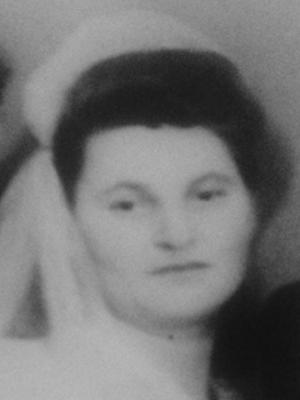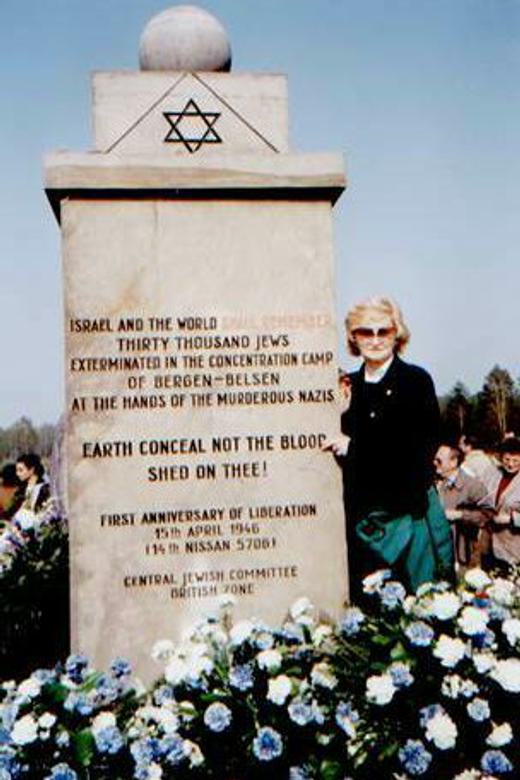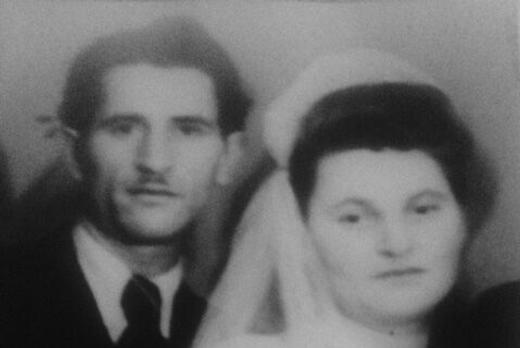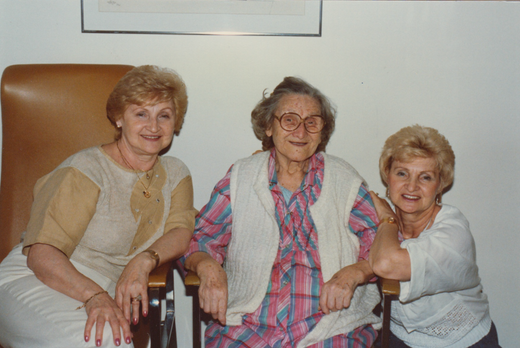Mania Rubinstein-Weinrib

Born: Wierzbnik (now Starachowice), Poland, 1925
Wartime experience: Ghetto and camps
Writing partner: Sari Merson
Mania (Mary) Rubinstein-Weinrib was born in Wierzbnik (now Starachowice), Poland, in 1925. In spring 1940, Mania was living under the Nazi regime, and the occupiers established a ghetto in Starachowice-Wierzbnik, where Jews were forced to live.
Mania and her family were already living in the area of the ghetto and did not have to move to a different home. They took in people who needed a home, and they lived in the ghetto for more than two years. In October 1942, when the ghetto was liquidated, Mania was sent to a forced labour camp called Strzelnica, near Wierzbnik. There, she met a man named Monyek (Morris), who would become her husband after the war. In July 1944, Mania, her mother and her sister were deported to Auschwitz-Birkenau; a few months later, they were sent to the Bergen-Belsen concentration camp. In April 1945, they were liberated by the British army. Mania and her family continued living in Bergen-Belsen, which had become a displaced persons camp, and she eventually reunited with Monyek there. They married in Bergen-Belsen in 1946 and immigrated to Canada in 1948, settling in Toronto and raising a family. Mania Rubinstein-Weinrib passed away in 2021.
A Night in the Trenches
I was in school in Wierzbnik up until 1939, when the Germans came. I didn’t finish school because the war broke out. I had liked school, especially geography. It was a mixed school — Jews and gentiles — and I used to go to a separate Jewish school after classes for a couple of hours. Then, the Nazis ruined our lives. When I think back on it, how did the world let them do this? Yet, these things are still happening in the world today — the killing of innocents.
In 1938, there was already talk of the Germans taking over the world. I was thirteen years old, and it was very scary to hear this. As a child, I didn’t believe it would happen. But I remember some people saying that the Germans were killing mostly Jews. I heard a group of people saying that the Jews in Germany must have done something, and that’s why they were killing them. But the Jews didn’t do anything wrong. They just minded their business and they worked hard. These people couldn’t believe that Jews were being killed just for being Jewish. I was so scared, scared that it would happen here.
At the onset of the war, my father told us we had to evacuate because Starachowice, which was a big town, had a munitions and steel factory. We knew that the first thing the Germans would do was bomb us. Practically three-quarters of the city moved out to a small farm somewhere, as we did. My father put everything that could fit with us onto a horse and buggy, and we went to a small town where he had a friend to stay there until the war was over. We thought maybe the war would last four or six months …. Our whole family — uncles, aunts and cousins — came with us. We didn’t have any food with us. I decided to go find food with my cousin Miriam, who was the same age as me.
When we got back to town, it was already dark. The Polish soldiers were standing on guard to not let the Germans into the town. When we told the soldiers why we came and asked if they could give us bread or something else to eat, they said they could not help, and they threw us into the trenches to hide us because the Germans were coming. We could hear what they were saying in Polish, and we knew that they were fighting. My cousin and I spent the night in the trenches. The next morning, when we got out, we didn’t know where we were. Many of the Polish soldiers had been killed. We started knocking on the door of every building. The night before, we had heard the airplanes and falling bombs, and we found out that two girls had gotten killed.
Very late in the afternoon, we were still looking for our parents. We didn’t know where they were. Finally, we heard prayers, Jewish prayers. We knocked on the door of where the sound was coming from and went in to see my father in his tallis, saying Kaddish for me. My uncle was doing the same for my cousin. When my parents and my uncle had found out that two girls were killed, they believed that it was us. This was the beginning of our life in the war.
It is a love story, how we came together and how we found each other after the war.
Saved at the Selection
I worked in the Rogalin brick factory when we lived in the ghetto. My ten-year-old brother, Harold, and my twelve-year-old sister, Ida, worked in the munitions factory. My mother was delivering food to the Germans. My sister, Ida, was working one night in the munitions factory when a piece of iron fell on her foot and broke it, causing her to limp. The Jewish policeman who was bringing us back and forth from work to the ghetto said to her, “Ida, stay overnight here.” He already knew what was about to happen. He said to her, “You stay overnight, don’t go home!” That’s the way she was saved. Otherwise, with her broken foot ….
The next day, October 27, 1942, was the Aktion. The Germans came around four in the morning and took us out to the rynek, the marketplace. We had to leave everything we had and just go to the market, where we were selected either for work in the forced labour camps or to go in the cattle cars to our deaths.
We were lucky that the Polish police commissioner knew my father and had been his friend. He made sure that my mother and I were in the line of those going to work. My mother begged him to go and make sure that her son was in the same line. He went to where the men were to be taken away to their deaths and he took Harold out and put him in the line to go to the work camp. The commissioner could have been killed. It is also lucky that my brother was tall, so he didn’t look ten. When he had been asked how old he was, he had said sixteen.
At the square, after selection, we were forced to run to a nearby labour camp called Strzelnica. If you couldn’t move fast enough, you were shot. An uncle of mine, he didn’t go so fast. They killed him right on the spot and I saw it. Maybe twenty or more people got killed that day — I don’t know how we survived. When I think back now, it was a miracle. When I was running up the hill to the camp, a soldier passed by and looked at my boots. They had been made by my father’s friend Mr. Gotlieb, who was the best shoemaker. The sole of the heel was three layers of different colours. I was so excited to have gotten those boots for one of my birthdays. That soldier told me to take them off, and he took them from me. I had to run barefoot for miles in the mud. Somehow, I got a pair of shoes the next morning. My feet were so bruised and sore.
In the beginning, my nights were terrible. The conditions in Strzelnica were terrible and filthy. I was scared to death. But I had to live. I had to go on. I lived through this somehow, but I wonder sometimes how I survived, how come they didn’t kill me.
I had a cousin, the most beautiful girl. One day we were marched back from work by Ukrainian soldiers, who were worse than the Germans. They left us standing at the gate because they were going to shoot ten people. The ten people had to dig their own graves and one of the ten was my cousin. She was gorgeous, like an actress. There were, I think, four or five women in that group and the rest were men. The Ukrainians made us come to the holes to see them all being shot. I’m sure a lot of them were still alive when they were being covered with earth. We had to stay in camp and watch this, watch them die. I don’t know why the soldiers did this. They didn't need to have a reason to shoot.
In Strzelnica, I was loading cargo along with men. One younger boy working there always had a piece of bread. He was a little guy, but he was as strong as I was and maybe even the same age as me. He always wanted to give me his bread. I kept saying, “No, it’s for you and you should eat it. I don’t want any bread. Don’t give it to me.” He was always looking out for me.
I used to see a man driving a crane that was carrying a hot iron back and forth and I remember thinking that a Jew wouldn’t be able to do this type of work, that they had a goy (non-Jew) here to do it. One day, the small guy came with this man, and he pointed at me and said, “This is the girl.” He told the man that he wanted to help me and talk to me, that he liked me but I wouldn’t take anything from him or talk to him. That man came with the boy to tell me I should take the bread. When I saw the little guy approaching with the man, I said, “Why did you bring this goy with you?” He said, “He’s not a goy, he’s a Jew!” I was shocked. That man, who I much later learned was Monyek, was eventually to be my husband.
After that, every day Monyek passed by, he waved to me. When we were walking back to the camp in the mornings and in the afternoons, he managed to be close by my side so he could talk to me. The men lived separately from the women, so it wasn’t always easy. I found out later that Monyek had bought me a lighter job there, even at a time when I didn’t have much to do with him. He had a little gold in his shoe that he gave to the manager, and he got me a job spraying the hot iron with a hose so that it would not ignite.
That’s the way it started. It is a love story, how we came together and how we found each other after the war.

Mania at Bergen-Belsen on the 50th anniversary of liberation. Germany, 1995.

Mania and Monyek at their wedding. Bergen-Belsen, 1946.

Mania (centre) with friends Ruzya and Yita. Toronto, date unknown.
Love Lost and Found
I hadn’t seen Monyek after we were transported to Auschwitz. Near our barracks where the women worked, there was a fence. I heard later that Monyek used to come very close to the fence and ask the women there, “Do you know if there is a Mania Rubinstein? Do you know her?” A woman said, “Yes, she’s in my barracks.” He had a pair of shoes and he asked her if she would give them to me. She agreed to take only one shoe because she was worried that she’d be killed for walking around with a pair. So he gave her one shoe and when she came back from work she came into our barracks and found me. She said, “Mania, do you know a Monyek?” I said, “No.” I had never even known his name, even after being so close for two years in Strzelnica! I asked what he looked like and then realized who it was. She gave me the shoe he sent and a piece of bread. The next time he saw the woman, he gave her the second shoe.
After the war, in the Bergen-Belsen displaced persons camp, we didn’t have anything and we had to stand in line for soup. Every time I went to the soup line, a Jewish policeman would come up and start talking to me. He told me that I didn’t have to stand in line and that he would get me the soup. I was so excited that a policeman was bringing me the soup. He brought me a big bowl of it. I was so happy I started running back to where we were staying, and he ran after me saying that he wanted to carry it for me. I said, “No, you go help the other people.”
Every day, this policeman was waiting for me in the line. Then he started coming to visit me, too. My sister and my mother and I shared a room with a mother and her daughter. This policeman, because he had a lot of privileges, found us our own room, one just for me, my mother and my sister.
I now saw what was happening here. I told the policeman, Leon, that I had a boyfriend I was waiting for. “If he’s not alive,” I said, “I will be your friend. But if he’s alive I don’t want anybody but him.” I would take my cousin Ita with me whenever I went anywhere with this policeman to make sure he would not make any advances because he was really in love with me.
One day we all went to a party where people were coming together from Leon’s town, Ostrowiec. Monyek was also from Ostrowiec. Sure enough, a friend of Leon’s told him he was looking for a Mania Rubinstein. He said he had a letter for her, and he wouldn’t tell him who the letter was from. I was right beside him. I jumped up and grabbed the letter and started running. It was from Monyek! And he had written that he had seen my brother, and I had thought my brother was dead! Monyek wrote that he was coming to Bergen-Belsen and bringing my brother with him. As I read this, I was screaming and running to my block. My mother was looking out the window and she saw me screaming and crying and carrying on. She slapped me a few times and held on to me until I could calm down. She kept saying, “What’s wrong? Tell me what’s wrong!” I said, “My brother is alive! Mom, your son is coming back!”
One night, there was an opera in the camp and Leon had tickets to it. He wanted me to come, but I would go only on condition that he take Ita, my cousin, as well. As I was walking with Ita and Leon, I saw a bunch of people in a corner with knapsacks and I wondered who they were. Then I saw a man, right in the front, who looked like Monyek. I asked Ita to call out his name because the policeman was right there. She yelled, “Monyek!” but there was no answer. We continued walking and I remember there was a river going through that you had to jump over. Ita jumped over and Leon jumped over and I stood there. I asked Ita to wait for me and told her I’d be right back. Something was pushing me to go and see exactly who those people were because I was expecting Monyek. I called out, “Monyek!” And it was him!
Four days after Monyek arrived, I was looking out the window when I heard a friend of mine shouting my name. I leaned out the window and said, “What do you want?” He said, “I got a present for you — come, come!” All of a sudden I saw my brother come from behind the building. I could have jumped out that window!
As far as the policeman, Leon, I introduced him to my best friend and they were married. They moved to Israel, but he still used to ask my uncle about me all the time. Eventually, they divorced.
Monyek and I were married on November 21, 1946, in the mess hall in Bergen-Belsen. We were supposed to have gotten married in July, but my husband wanted his brother at the wedding. My husband’s brother had survived in Europe, and he was in Poland. I had my mother, my sister and my brother, family from my side, and Monyek had nobody, just himself. One day, I came to the room and saw that Monyek was crying. When I asked him what was wrong, he said, “My brother said he was coming and now he told me he can’t come.”
I had an uncle, Rabbi Helfgott, in Bergen-Belsen who said I shouldn’t change the date, that it was very unlucky. Jews don’t postpone anything like a wedding. I said, “Uncle, my husband has nobody here and I cannot have that.” So my wedding was postponed until November so that his brother could come. I had sent out invitations and I had to change everything. I had to go knocking on doors. We were still in Bergen-Belsen. We didn’t leave Bergen-Belsen until 1948.
***
This was the story of my husband and I, how we met and found each other again. Sometimes even I don’t believe how all this happened. But I lost my husband early in life; he was only forty-five years old. He was such a nice man, a good man. He was a devoted father and husband. I wanted another ten years with him. My kids were young at the time — Allan, the youngest, was only four years old. It was such a shock. Monyek died in five minutes. His life went out while I was holding him. I waited for 911 to come as quickly as possible. In my arms …. It was a true love story. The way we found each other, the way I resisted going with anyone else. I had so many suitors after the war, but I just wanted him.
In 1995, I went back to Poland with my kids, Susie, Geddy and Allan, for the fiftieth anniversary of liberation. I wanted to go, and I was also scared to go. I was afraid to go with my kids; I thought that Jews were still being killed in Poland. There were Jews in Starachowice who had been killed right after the war, after leaving the camps to go back home. And our neighbours had taken all our jewels and everything else we’d had to leave behind.
After we arrived in Poland, we hired a guide with a car to take us around. In Wierzbnik, we went to see my house. The curtains that I still remembered were hanging! These were the curtains my mother made before the war. I used to tell my children that before the war a big building stood beside my house. But now I saw that the building was only one floor higher than my house! Because I was a child, I had thought it was a big building.
We also went to Auschwitz. When we came out, I said, “I survived Auschwitz twice!” I survived!

